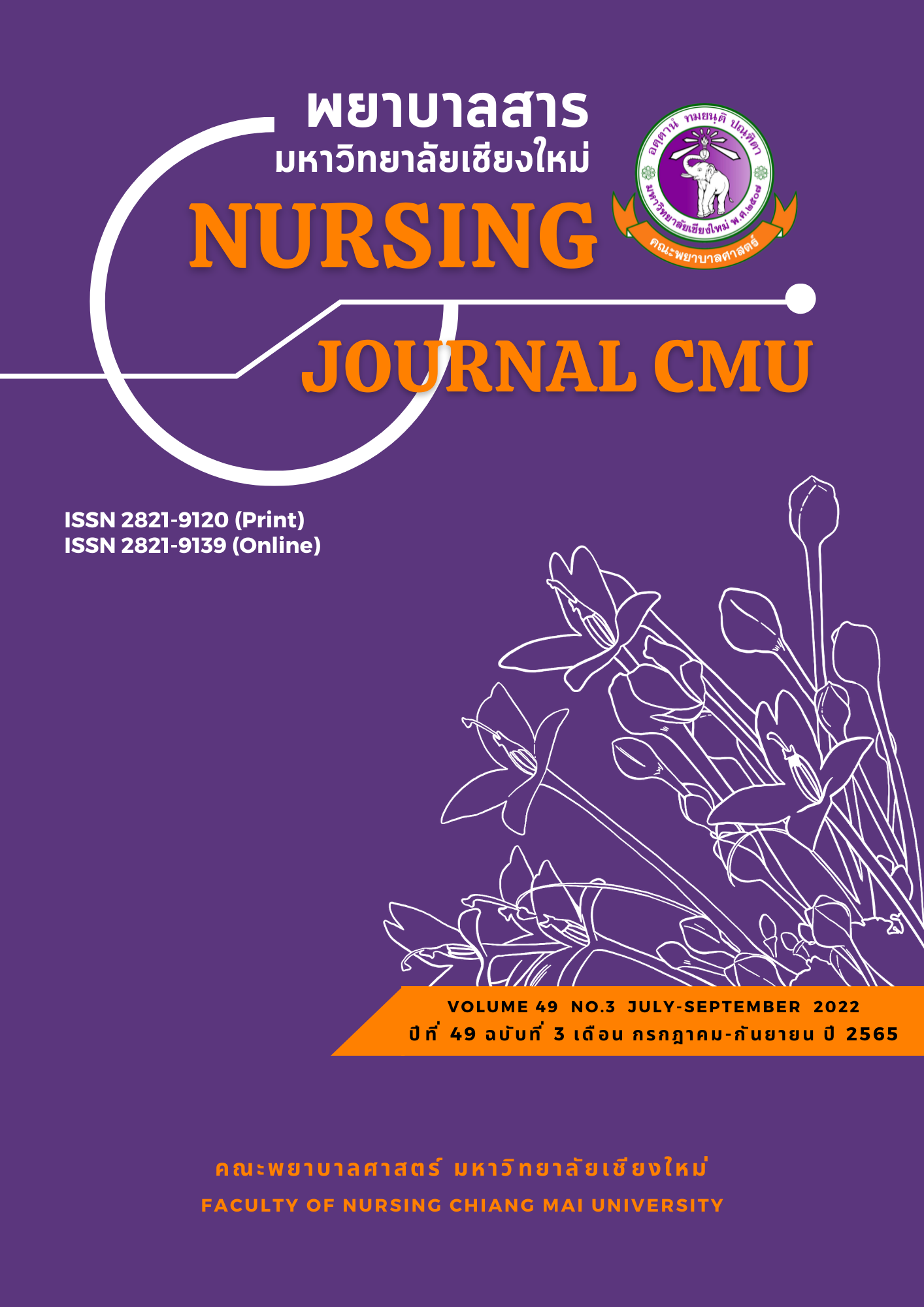Effects of a Capacity Building Program for Village Health Volunteers on Knowledge and Sodium Consumption Behaviors Among Persons with Uncontrolled Hypertension
Keywords:
Sodium consumption, A capacity building program, Village health volunteers, Uncontrolled hypertensionAbstract
Sodium consumption behavior in people with hypertension is an important factor in controlling blood pressure levels. This quasi-experimental research investigated the effects of a capacity building program for village health volunteers on knowledge and behaviors related to sodium consumption among persons with uncontrolled hypertension. The sample consisted of persons with uncontrolled hypertension, consisting of one group which received knowledge from the village health volunteers who participated in the capacity building program and one group which received standard nursing care. Purposive sampling was used with 54 persons who were divided equally into the two groups (27 persons per group). The instruments utilized in the study included the capacity building program for village health volunteers based on the competency concept (McClelland, 1993), a lesson plan for village health volunteers, a book on eating less salt to control blood pressure, a successful model for village health volunteers, and a salt meter. The data collecting instruments consisted of two questionnaires: one on knowledge related to sodium consumption and one on sodium consumption behavior. The instruments were validated for quality and validity (IOC = .80, CVI = .80 respectively), and reliability (.87, .78 respectively) was acceptable. The data was then analyzed using Wilcoxon and the Mann Whitney U test.
The results showed that after the program, the group which received knowledge from the village health volunteers who participated in capacity development had significantly higher average scores for sodium consumption knowledge than before participating in the program, and more than those of the group which received standard nursing care (p < .001, p < .001 respectively). In addition, the mean score of sodium consumption behaviors for the group which received knowledge from the village health volunteers was significantly higher than before participating in the program and more than that of the group which received nursing care (p < .001, p < .001 respectively).
The results of this research point to the effect of the village health volunteers capacity development program and the use of the mentoring process to transfer knowledge. The group of people with uncontrolled hypertension had the knowledge and the ability to effectively modify sodium consumption behavior.
References
Chosungnoen, N. (2017). Health promotion to improve health behavior in people who working age which aim to prevent hypertension. Primary Health Care Division Journal, 12(1), 9-16. (in Thai)
Jarupisitpaiboon, C., Premmasawat, N., Pesungnoen, A., Rungnoei N., & Dankul, P. (2021). Guidelines for potential development of village health volunteers to prevent stroke in a risk group. Nursing Journal of the Ministry of Public Health, 30(3), 74-89. (in Thai)
Jewpraditkul, S. (2020). Self-care behaviors and blood pressure controlling ability of essential hypertension patients, Muang Potawas primary care unit. Journal of Health Research and Innovation, 3(1), 15-30. (in Thai)
Keyong, E. (2018). The performance of village health volunteers in the midst of change. Journal of Health Systems Research, 11(1), 118-126. (in Thai)
Maneetup, K., & Danseekaew, S. (2017). Situation of salt intake among people with hypertension in Thangkhuang Subdistrict, Waengnoi District, Khon Kaen Province. Journal of Nursing and Health Care, 35(4), 140-149. (in Thai)
McClelland, D. C. (1973). Testing for competence rather than for Intelligence. American Psychologist, 28(1), 1-14.
Phukaolaun, S. (2014). Mentoring system for working on human capital management enhancement projects. Bangkok: Mdicp Holding. (in Thai)
Ruaysundneon, S., Sansom, D., Methakarnjanasuk, N., Danseekaew, S., Chaiyapum, N., Khuntamul, R., & Dumnok, K. (2018). High sodium consumption situation and perception relevant to high sodium consumption associated with chronic kidney disease among people with chronic non-communicable disease. Journal of Nursing and Health Care, 36(3), 242-250. (in Thai)
Ruerkluenrit, J., & Kodchakrai, R. (2014). Effectiveness of health volunteer’s competency development program on knowledge and satisfaction on services among persons with diabetes type 2 in a community of Bangkok Metropolis. Thai Pharmaceutical and Health Science Journal, 9(4), 157-163. (in Thai)
Sereesuchart, W., BoonChu, W., & Junbailek, S. (2018). Eat a little less salty to conquer hypertension. Bangkok: Kaewjaojom Press Center. (in Thai)
Songwatthanayuth, P., Watthanakorn, K., Klinhom, K., & Ratanapat, P. (2016). Effects of family and village health volunteer participation program on health promoting behaviors, and blood pressure in pre-hypertension adults. Veridian E-Journal, Science and Technology Silpakorn University, 3(3), 1-14. (in Thai)
Suksaad, T., Gnamaroon, W., & Suriyawongpisan, W. (n.d.). NCDs situation report “kick off to the goals. International Health Policy Program.
Supavanuch, C., Warae, I., & Wanitchanon, K. (2020). Factors relating work performance of village health volunteers in Narathiwat Province [Research Report]. Narathiwat: Princess of Narathiwas University. (in Thai)
Thai Hypertension Society. (2019). Thai guidelines on the treatment of hypertension 2015. Bangkok: Author. (in Thai)
Wamakhan, P., Wongpirom, R., & Punyakhomchanthaphun, P. (2020). The perception of hypertension information, prevention disease behavior and image of department of disease control of people living in region 10th area. The Office of Disease Prevention and Control 10th Journal, 18(2), 19-33. (in Thai)
Wicheyun, W. (2015). Knowledge and attitudes on the surveillance, prevention and control of diabetes mellitus and hypertension among village health volunteers in Li District, Lamphun Province (Unpublished master’s thesis). Chiang Mai University, Thailand. (in Thai)
World Health Organization. (2021). Data report. Retrieved from https://www.who.int
Downloads
Published
How to Cite
Issue
Section
License
Copyright (c) 2022 Nursing Journal

This work is licensed under a Creative Commons Attribution-NonCommercial-NoDerivatives 4.0 International License.
บทความที่ได้รับการตีพิมพ์เป็นลิขสิทธิ์ของวารสารพยาบาลสาร
ข้อความที่ปรากฏในบทความแต่ละเรื่องในวารสารวิชาการเล่มนี้เป็นความคิดเห็นส่วนตัวของผู้เขียนแต่ละท่านไม่เกี่ยวข้องกับมหาวิทยาลัยเชียงใหม่ และคณาจารย์ท่านอื่นๆในมหาวิทยาลัยฯ แต่อย่างใด ความรับผิดชอบองค์ประกอบทั้งหมดของบทความแต่ละเรื่องเป็นของผู้เขียนแต่ละท่าน หากมีความผิดพลาดใด ๆ ผู้เขียนแต่ละท่านจะรับผิดชอบบทความของตนเองแต่ผู้เดียว






